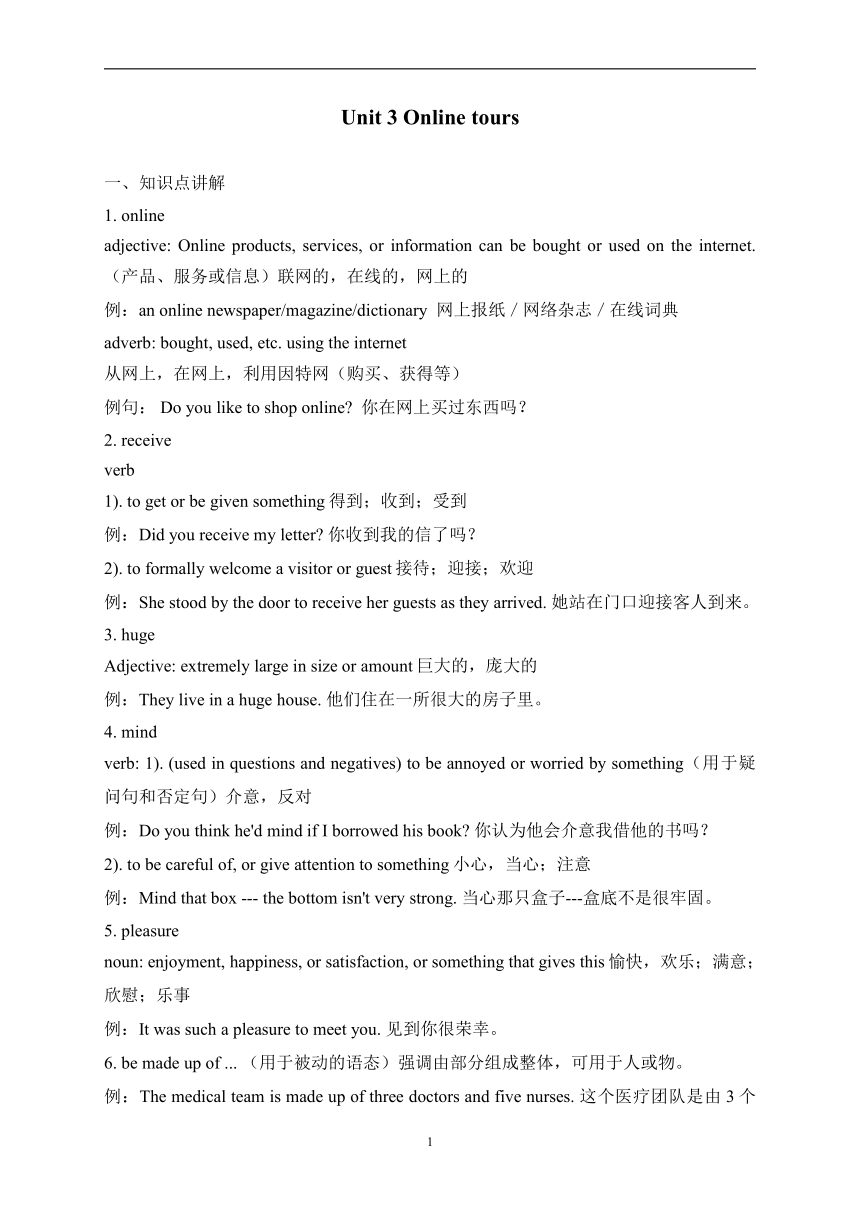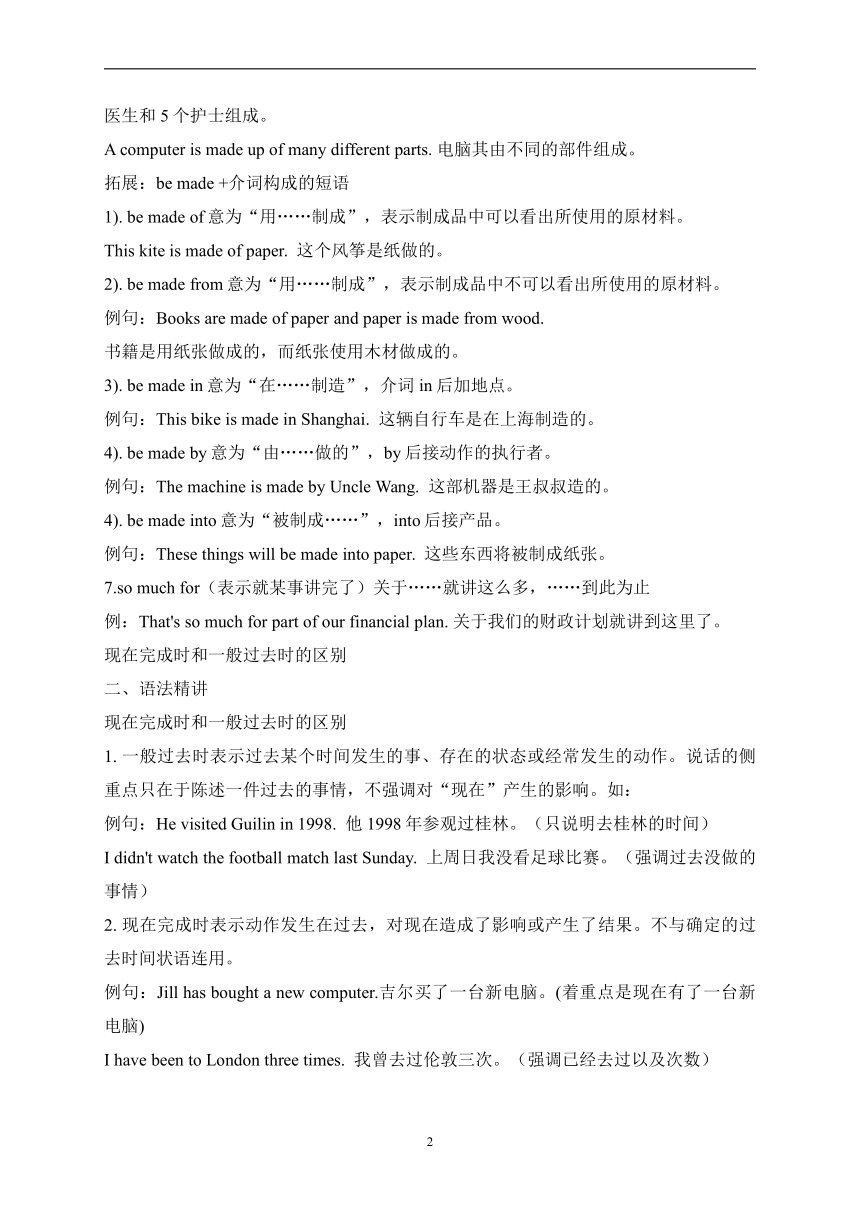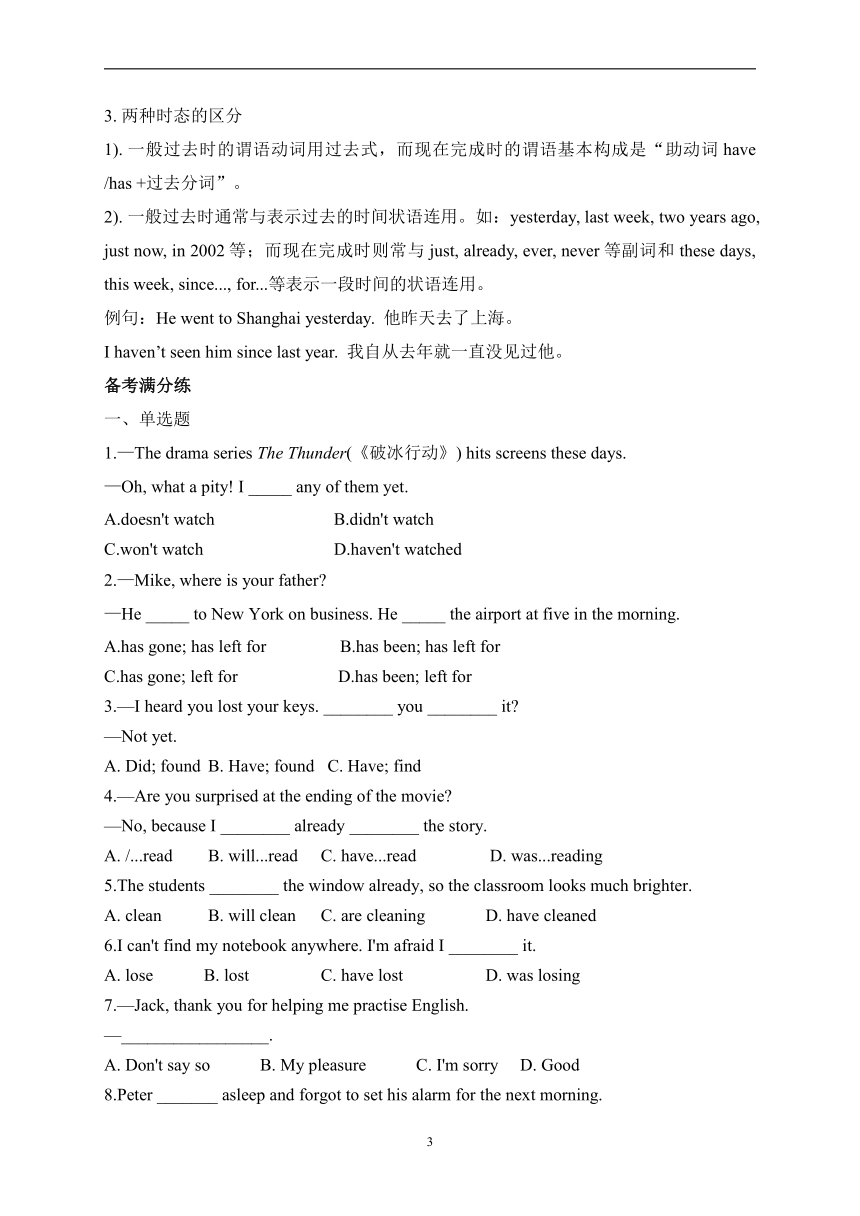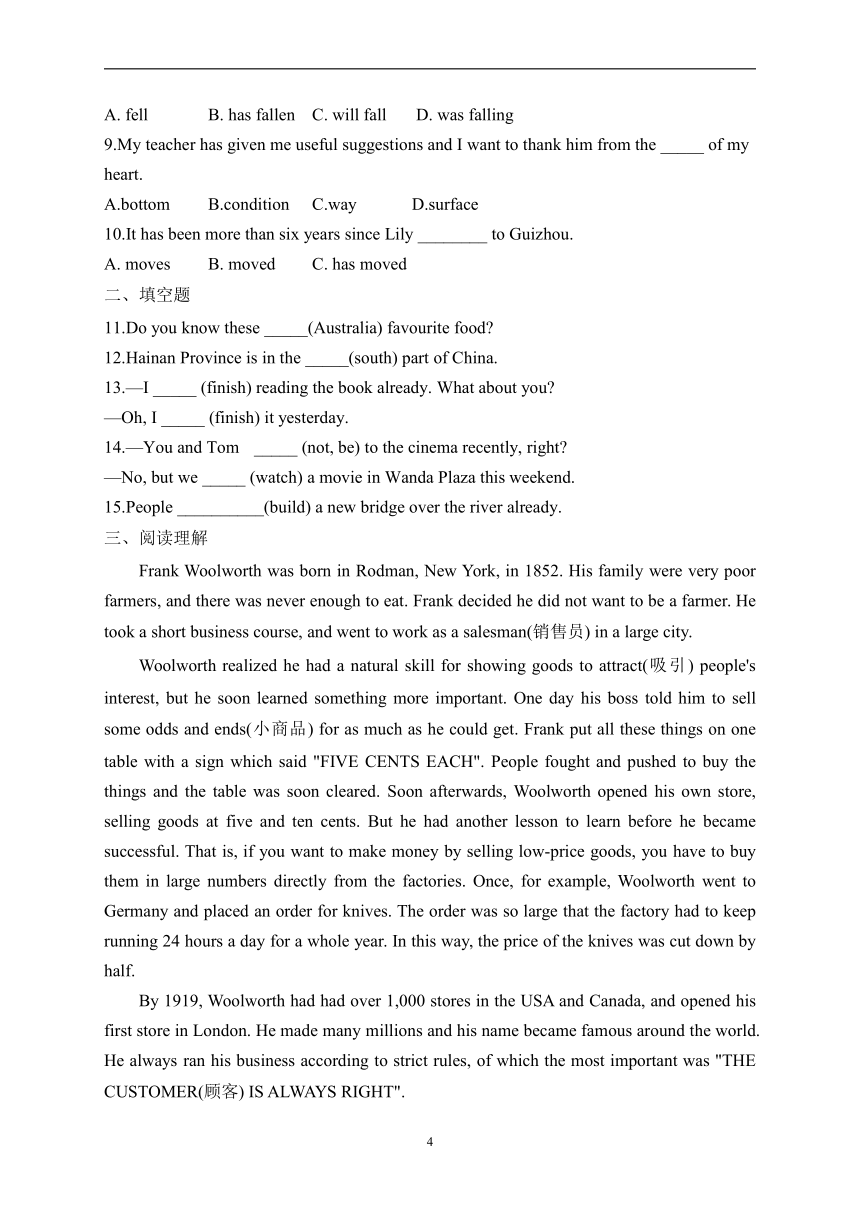Unit 3 Online tours——2022-2023学年牛津译林版英语八年级下学期期末复习备考攻略(含解析)
文档属性
| 名称 | Unit 3 Online tours——2022-2023学年牛津译林版英语八年级下学期期末复习备考攻略(含解析) |  | |
| 格式 | docx | ||
| 文件大小 | 30.3KB | ||
| 资源类型 | 教案 | ||
| 版本资源 | 牛津译林版 | ||
| 科目 | 英语 | ||
| 更新时间 | 2023-06-18 16:18:18 | ||
图片预览




文档简介
Unit 3 Online tours
一、知识点讲解
1. online
adjective: Online products, services, or information can be bought or used on the internet.(产品、服务或信息)联网的,在线的,网上的
例:an online newspaper/magazine/dictionary 网上报纸/网络杂志/在线词典
adverb: bought, used, etc. using the internet
从网上,在网上,利用因特网(购买、获得等)
例句: Do you like to shop online 你在网上买过东西吗?
2. receive
verb
1). to get or be given something得到;收到;受到
例:Did you receive my letter 你收到我的信了吗?
2). to formally welcome a visitor or guest接待;迎接;欢迎
例:She stood by the door to receive her guests as they arrived. 她站在门口迎接客人到来。
3. huge
Adjective: extremely large in size or amount巨大的,庞大的
例:They live in a huge house. 他们住在一所很大的房子里。
4. mind
verb: 1). (used in questions and negatives) to be annoyed or worried by something(用于疑问句和否定句)介意,反对
例:Do you think he'd mind if I borrowed his book 你认为他会介意我借他的书吗?
2). to be careful of, or give attention to something小心,当心;注意
例:Mind that box --- the bottom isn't very strong. 当心那只盒子---盒底不是很牢固。
5. pleasure
noun: enjoyment, happiness, or satisfaction, or something that gives this愉快,欢乐;满意;欣慰;乐事
例:It was such a pleasure to meet you. 见到你很荣幸。
6. be made up of ... (用于被动的语态)强调由部分组成整体,可用于人或物。
例:The medical team is made up of three doctors and five nurses. 这个医疗团队是由3个医生和5个护士组成。
A computer is made up of many different parts. 电脑其由不同的部件组成。
拓展:be made +介词构成的短语
1). be made of意为“用……制成”,表示制成品中可以看出所使用的原材料。
This kite is made of paper. 这个风筝是纸做的。
2). be made from意为“用……制成”,表示制成品中不可以看出所使用的原材料。
例句:Books are made of paper and paper is made from wood.
书籍是用纸张做成的,而纸张使用木材做成的。
3). be made in意为“在……制造”,介词in后加地点。
例句:This bike is made in Shanghai. 这辆自行车是在上海制造的。
4). be made by意为“由……做的”,by后接动作的执行者。
例句:The machine is made by Uncle Wang. 这部机器是王叔叔造的。
4). be made into意为“被制成……”,into后接产品。
例句:These things will be made into paper. 这些东西将被制成纸张。
7.so much for(表示就某事讲完了)关于……就讲这么多,……到此为止
例:That's so much for part of our financial plan. 关于我们的财政计划就讲到这里了。
现在完成时和一般过去时的区别
二、语法精讲
现在完成时和一般过去时的区别
1. 一般过去时表示过去某个时间发生的事、存在的状态或经常发生的动作。说话的侧重点只在于陈述一件过去的事情,不强调对“现在”产生的影响。如:
例句:He visited Guilin in 1998. 他1998年参观过桂林。(只说明去桂林的时间)
I didn't watch the football match last Sunday. 上周日我没看足球比赛。(强调过去没做的事情)
2. 现在完成时表示动作发生在过去,对现在造成了影响或产生了结果。不与确定的过去时间状语连用。
例句:Jill has bought a new computer.吉尔买了一台新电脑。(着重点是现在有了一台新电脑)
I have been to London three times. 我曾去过伦敦三次。(强调已经去过以及次数)
3. 两种时态的区分
1). 一般过去时的谓语动词用过去式,而现在完成时的谓语基本构成是“助动词have /has +过去分词”。
2). 一般过去时通常与表示过去的时间状语连用。如:yesterday, last week, two years ago, just now, in 2002等;而现在完成时则常与just, already, ever, never等副词和these days, this week, since..., for...等表示一段时间的状语连用。
例句:He went to Shanghai yesterday. 他昨天去了上海。
I haven’t seen him since last year. 我自从去年就一直没见过他。
备考满分练
一、单选题
1.—The drama series The Thunder(《破冰行动》) hits screens these days.
—Oh, what a pity! I _____ any of them yet.
A.doesn't watch B.didn't watch
C.won't watch D.haven't watched
2.—Mike, where is your father
—He _____ to New York on business. He _____ the airport at five in the morning.
A.has gone; has left for B.has been; has left for
C.has gone; left for D.has been; left for
3.—I heard you lost your keys. ________ you ________ it
—Not yet.
A. Did; found B. Have; found C. Have; find
4.—Are you surprised at the ending of the movie
—No, because I ________ already ________ the story.
A. /...read B. will...read C. have...read D. was...reading
5.The students ________ the window already, so the classroom looks much brighter.
A. clean B. will clean C. are cleaning D. have cleaned
6.I can't find my notebook anywhere. I'm afraid I ________ it.
A. lose B. lost C. have lost D. was losing
7.—Jack, thank you for helping me practise English.
—_________________.
A. Don't say so B. My pleasure C. I'm sorry D. Good
8.Peter _______ asleep and forgot to set his alarm for the next morning.
A. fell B. has fallen C. will fall D. was falling
9.My teacher has given me useful suggestions and I want to thank him from the _____ of my heart.
A.bottom B.condition C.way D.surface
10.It has been more than six years since Lily ________ to Guizhou.
A. moves B. moved C. has moved
二、填空题
11.Do you know these _____(Australia) favourite food
12.Hainan Province is in the _____(south) part of China.
13.—I _____ (finish) reading the book already. What about you
—Oh, I _____ (finish) it yesterday.
14.—You and Tom _____ (not, be) to the cinema recently, right
—No, but we _____ (watch) a movie in Wanda Plaza this weekend.
15.People __________(build) a new bridge over the river already.
三、阅读理解
Frank Woolworth was born in Rodman, New York, in 1852. His family were very poor farmers, and there was never enough to eat. Frank decided he did not want to be a farmer. He took a short business course, and went to work as a salesman(销售员) in a large city.
Woolworth realized he had a natural skill for showing goods to attract(吸引) people's interest, but he soon learned something more important. One day his boss told him to sell some odds and ends(小商品) for as much as he could get. Frank put all these things on one table with a sign which said "FIVE CENTS EACH". People fought and pushed to buy the things and the table was soon cleared. Soon afterwards, Woolworth opened his own store, selling goods at five and ten cents. But he had another lesson to learn before he became successful. That is, if you want to make money by selling low-price goods, you have to buy them in large numbers directly from the factories. Once, for example, Woolworth went to Germany and placed an order for knives. The order was so large that the factory had to keep running 24 hours a day for a whole year. In this way, the price of the knives was cut down by half.
By 1919, Woolworth had had over 1,000 stores in the USA and Canada, and opened his first store in London. He made many millions and his name became famous around the world. He always ran his business according to strict rules, of which the most important was "THE CUSTOMER(顾客) IS ALWAYS RIGHT".
16.Frank took a short business course to ________.
A. make more money for his family B. learn something from a salesman
C. get away from the farm D. get enough to eat
17.Frank sold the odds and ends quickly because ________.
A. he knew how to get people to buy his goods
B. he cut down the price by half
C. he had put the goods on a table in a very nice way
D. the sign he put on the table was well designed
18.The price of the knives was cut down by half because ________.
A. the factory workers worked 24 hours a day
B. knives were ordered in large numbers directly from the factory
C. labour(劳动力)was cheap in Germany
D. the knives were from only one factory
19.What makes Woolworth a world-famous man
A. His business skills and his wealth(财富).
B. The low price of the goods he sold.
C. His trip to Germany and his huge order of knives.
D. His natural skill for showing things.
20.The sentence “THE CUSTOMER IS ALWAYS RIGHT” tells us that ________.
A. whenever there is a quarrel between the customer and the salesman, the customer is always right
B. if you want to succeed, the rule is the only way
C. stores must always follow the customer’s orders if they want to make more money
D. stores should do their best to meet the customer’s needs if they want to be successful
答案以及解析
1.答案:D
解析:句意: —这几天, 电视连续剧《破冰行动》登上了荧屏。—哦, 真遗憾! 我还一点也没有看过。答语中的yet意为"还", 为现在完成时的标志。故选D。
2.答案:C
解析:句意: —迈克, 你爸爸在哪儿 —他去纽约出差了。他今天早上5点出发去机场了。根据语境可知第一空表示"去了某处", 要用have gone to, 而have been to表示"去过某地"; leave for… 表示"出发去......", 根据语境可知, 动作发生在过去, 故用一般过去时。故选C。
3.答案:B
解析:句意:—我听说你丢了钥匙。你找到了吗?—还没有。考查动词现在完成时态。根据答语"Not yet."可知问句应用现在完成时,not yet是现在完成时态的标志,表达"尚未,还没呢",现在完成时结构为have/has + 过去分词。故选B。
4.答案:C
解析:句意:—你对电影的结局感到惊讶吗?—不,因为我已经看过这个故事了。考查时态。根据already可知,此处用现在完成时have/has done的结构,表示过去看过故事对现在的影响。故选C。
5.答案:D
解析:句意:学生们已经擦了窗户,所以教室看起来明亮多了。考查时态。根据“”already"和"so the classroom looks much brighter"可知,擦窗户的动作发生在过去,对现在产生的影响是窗户更明亮了,时态用现在完成时,谓语结构是"have/has done"。故选D。
6.答案:C
解析:句意:我到处都找不到我的笔记本。恐怕我把它弄丢了。考查动词时态。根据"I can't find my notebook anywhere."可知,笔记本丢了,现在找不到了;强调过去发生的动作对现在造成的影响要用现在完成时,结构为have done。故选C。
7.答案:B
解析:句意:—Jack,感谢你帮助我练习英语。—不客气。考查情景交际用语辨析。Don't say so不要这样说;My pleasure不客气;I'm sorry对不起;Good好的。根据"thank you"可知,应是回答不客气。故选B。
8.答案:A
解析:句意:Peter睡着了,忘了设置第二天早晨的闹钟。考查动词时态。根据"Peter...asleep and forgot..."可知,and连接并列谓语,此句为一般过去时态,fall asleep"睡着",此处应用动词fall的过去式fell。故选A。
9.答案:A
解析:句意: 我的老师给了我有用的建议, 我想衷心地感谢他。bottom底部; condition条件; way方式, 方法; surface表面。可知,我打心底感谢我的老师。故选A。
10.答案:B
解析:句意:莉莉自搬到贵州以来已经六年多了。考查动词时态。since引导的时间状语从句,从句用一般过去时,主句用现在完成时,所以此空应填moved。故选B。
二、填空题
11.答案:Australians'
12.答案:southern
13.答案:have finished; finished
14.答案:haven't been; will/ shall watch
15.答案:have built
三、阅读理解
16.答案:C
解析:细节理解题。根据第一段"Frank decided he did not want to be a farmer...as a salesman in a large city."可知,他不想成为一个农民,想去大城市工作。故选C。
17.答案:A
解析:细节理解题。根据第二段"Woolworth realized he had a natural skill for placing goods to attract people's interest."可知,他知道怎么让人们购买他的东西。故选A。
18.答案:B
解析:细节理解题。根据第三段"The order was so large that the factory ...was cut down by half."可知,因为大量的订单,所以小刀的价格减半。故选B。
19.答案:A
解析:细节理解题。根据最后一段"He made many millions and his name became famous all over the world."可知,是因为他的商业技能和财富。故选A。
20.答案:D
解析:推理判断题。通过全文以及他的商业理念可知这句话的意思是"商店要想成功,就应该尽力满足顾客的需要"。故选D。
2
一、知识点讲解
1. online
adjective: Online products, services, or information can be bought or used on the internet.(产品、服务或信息)联网的,在线的,网上的
例:an online newspaper/magazine/dictionary 网上报纸/网络杂志/在线词典
adverb: bought, used, etc. using the internet
从网上,在网上,利用因特网(购买、获得等)
例句: Do you like to shop online 你在网上买过东西吗?
2. receive
verb
1). to get or be given something得到;收到;受到
例:Did you receive my letter 你收到我的信了吗?
2). to formally welcome a visitor or guest接待;迎接;欢迎
例:She stood by the door to receive her guests as they arrived. 她站在门口迎接客人到来。
3. huge
Adjective: extremely large in size or amount巨大的,庞大的
例:They live in a huge house. 他们住在一所很大的房子里。
4. mind
verb: 1). (used in questions and negatives) to be annoyed or worried by something(用于疑问句和否定句)介意,反对
例:Do you think he'd mind if I borrowed his book 你认为他会介意我借他的书吗?
2). to be careful of, or give attention to something小心,当心;注意
例:Mind that box --- the bottom isn't very strong. 当心那只盒子---盒底不是很牢固。
5. pleasure
noun: enjoyment, happiness, or satisfaction, or something that gives this愉快,欢乐;满意;欣慰;乐事
例:It was such a pleasure to meet you. 见到你很荣幸。
6. be made up of ... (用于被动的语态)强调由部分组成整体,可用于人或物。
例:The medical team is made up of three doctors and five nurses. 这个医疗团队是由3个医生和5个护士组成。
A computer is made up of many different parts. 电脑其由不同的部件组成。
拓展:be made +介词构成的短语
1). be made of意为“用……制成”,表示制成品中可以看出所使用的原材料。
This kite is made of paper. 这个风筝是纸做的。
2). be made from意为“用……制成”,表示制成品中不可以看出所使用的原材料。
例句:Books are made of paper and paper is made from wood.
书籍是用纸张做成的,而纸张使用木材做成的。
3). be made in意为“在……制造”,介词in后加地点。
例句:This bike is made in Shanghai. 这辆自行车是在上海制造的。
4). be made by意为“由……做的”,by后接动作的执行者。
例句:The machine is made by Uncle Wang. 这部机器是王叔叔造的。
4). be made into意为“被制成……”,into后接产品。
例句:These things will be made into paper. 这些东西将被制成纸张。
7.so much for(表示就某事讲完了)关于……就讲这么多,……到此为止
例:That's so much for part of our financial plan. 关于我们的财政计划就讲到这里了。
现在完成时和一般过去时的区别
二、语法精讲
现在完成时和一般过去时的区别
1. 一般过去时表示过去某个时间发生的事、存在的状态或经常发生的动作。说话的侧重点只在于陈述一件过去的事情,不强调对“现在”产生的影响。如:
例句:He visited Guilin in 1998. 他1998年参观过桂林。(只说明去桂林的时间)
I didn't watch the football match last Sunday. 上周日我没看足球比赛。(强调过去没做的事情)
2. 现在完成时表示动作发生在过去,对现在造成了影响或产生了结果。不与确定的过去时间状语连用。
例句:Jill has bought a new computer.吉尔买了一台新电脑。(着重点是现在有了一台新电脑)
I have been to London three times. 我曾去过伦敦三次。(强调已经去过以及次数)
3. 两种时态的区分
1). 一般过去时的谓语动词用过去式,而现在完成时的谓语基本构成是“助动词have /has +过去分词”。
2). 一般过去时通常与表示过去的时间状语连用。如:yesterday, last week, two years ago, just now, in 2002等;而现在完成时则常与just, already, ever, never等副词和these days, this week, since..., for...等表示一段时间的状语连用。
例句:He went to Shanghai yesterday. 他昨天去了上海。
I haven’t seen him since last year. 我自从去年就一直没见过他。
备考满分练
一、单选题
1.—The drama series The Thunder(《破冰行动》) hits screens these days.
—Oh, what a pity! I _____ any of them yet.
A.doesn't watch B.didn't watch
C.won't watch D.haven't watched
2.—Mike, where is your father
—He _____ to New York on business. He _____ the airport at five in the morning.
A.has gone; has left for B.has been; has left for
C.has gone; left for D.has been; left for
3.—I heard you lost your keys. ________ you ________ it
—Not yet.
A. Did; found B. Have; found C. Have; find
4.—Are you surprised at the ending of the movie
—No, because I ________ already ________ the story.
A. /...read B. will...read C. have...read D. was...reading
5.The students ________ the window already, so the classroom looks much brighter.
A. clean B. will clean C. are cleaning D. have cleaned
6.I can't find my notebook anywhere. I'm afraid I ________ it.
A. lose B. lost C. have lost D. was losing
7.—Jack, thank you for helping me practise English.
—_________________.
A. Don't say so B. My pleasure C. I'm sorry D. Good
8.Peter _______ asleep and forgot to set his alarm for the next morning.
A. fell B. has fallen C. will fall D. was falling
9.My teacher has given me useful suggestions and I want to thank him from the _____ of my heart.
A.bottom B.condition C.way D.surface
10.It has been more than six years since Lily ________ to Guizhou.
A. moves B. moved C. has moved
二、填空题
11.Do you know these _____(Australia) favourite food
12.Hainan Province is in the _____(south) part of China.
13.—I _____ (finish) reading the book already. What about you
—Oh, I _____ (finish) it yesterday.
14.—You and Tom _____ (not, be) to the cinema recently, right
—No, but we _____ (watch) a movie in Wanda Plaza this weekend.
15.People __________(build) a new bridge over the river already.
三、阅读理解
Frank Woolworth was born in Rodman, New York, in 1852. His family were very poor farmers, and there was never enough to eat. Frank decided he did not want to be a farmer. He took a short business course, and went to work as a salesman(销售员) in a large city.
Woolworth realized he had a natural skill for showing goods to attract(吸引) people's interest, but he soon learned something more important. One day his boss told him to sell some odds and ends(小商品) for as much as he could get. Frank put all these things on one table with a sign which said "FIVE CENTS EACH". People fought and pushed to buy the things and the table was soon cleared. Soon afterwards, Woolworth opened his own store, selling goods at five and ten cents. But he had another lesson to learn before he became successful. That is, if you want to make money by selling low-price goods, you have to buy them in large numbers directly from the factories. Once, for example, Woolworth went to Germany and placed an order for knives. The order was so large that the factory had to keep running 24 hours a day for a whole year. In this way, the price of the knives was cut down by half.
By 1919, Woolworth had had over 1,000 stores in the USA and Canada, and opened his first store in London. He made many millions and his name became famous around the world. He always ran his business according to strict rules, of which the most important was "THE CUSTOMER(顾客) IS ALWAYS RIGHT".
16.Frank took a short business course to ________.
A. make more money for his family B. learn something from a salesman
C. get away from the farm D. get enough to eat
17.Frank sold the odds and ends quickly because ________.
A. he knew how to get people to buy his goods
B. he cut down the price by half
C. he had put the goods on a table in a very nice way
D. the sign he put on the table was well designed
18.The price of the knives was cut down by half because ________.
A. the factory workers worked 24 hours a day
B. knives were ordered in large numbers directly from the factory
C. labour(劳动力)was cheap in Germany
D. the knives were from only one factory
19.What makes Woolworth a world-famous man
A. His business skills and his wealth(财富).
B. The low price of the goods he sold.
C. His trip to Germany and his huge order of knives.
D. His natural skill for showing things.
20.The sentence “THE CUSTOMER IS ALWAYS RIGHT” tells us that ________.
A. whenever there is a quarrel between the customer and the salesman, the customer is always right
B. if you want to succeed, the rule is the only way
C. stores must always follow the customer’s orders if they want to make more money
D. stores should do their best to meet the customer’s needs if they want to be successful
答案以及解析
1.答案:D
解析:句意: —这几天, 电视连续剧《破冰行动》登上了荧屏。—哦, 真遗憾! 我还一点也没有看过。答语中的yet意为"还", 为现在完成时的标志。故选D。
2.答案:C
解析:句意: —迈克, 你爸爸在哪儿 —他去纽约出差了。他今天早上5点出发去机场了。根据语境可知第一空表示"去了某处", 要用have gone to, 而have been to表示"去过某地"; leave for… 表示"出发去......", 根据语境可知, 动作发生在过去, 故用一般过去时。故选C。
3.答案:B
解析:句意:—我听说你丢了钥匙。你找到了吗?—还没有。考查动词现在完成时态。根据答语"Not yet."可知问句应用现在完成时,not yet是现在完成时态的标志,表达"尚未,还没呢",现在完成时结构为have/has + 过去分词。故选B。
4.答案:C
解析:句意:—你对电影的结局感到惊讶吗?—不,因为我已经看过这个故事了。考查时态。根据already可知,此处用现在完成时have/has done的结构,表示过去看过故事对现在的影响。故选C。
5.答案:D
解析:句意:学生们已经擦了窗户,所以教室看起来明亮多了。考查时态。根据“”already"和"so the classroom looks much brighter"可知,擦窗户的动作发生在过去,对现在产生的影响是窗户更明亮了,时态用现在完成时,谓语结构是"have/has done"。故选D。
6.答案:C
解析:句意:我到处都找不到我的笔记本。恐怕我把它弄丢了。考查动词时态。根据"I can't find my notebook anywhere."可知,笔记本丢了,现在找不到了;强调过去发生的动作对现在造成的影响要用现在完成时,结构为have done。故选C。
7.答案:B
解析:句意:—Jack,感谢你帮助我练习英语。—不客气。考查情景交际用语辨析。Don't say so不要这样说;My pleasure不客气;I'm sorry对不起;Good好的。根据"thank you"可知,应是回答不客气。故选B。
8.答案:A
解析:句意:Peter睡着了,忘了设置第二天早晨的闹钟。考查动词时态。根据"Peter...asleep and forgot..."可知,and连接并列谓语,此句为一般过去时态,fall asleep"睡着",此处应用动词fall的过去式fell。故选A。
9.答案:A
解析:句意: 我的老师给了我有用的建议, 我想衷心地感谢他。bottom底部; condition条件; way方式, 方法; surface表面。可知,我打心底感谢我的老师。故选A。
10.答案:B
解析:句意:莉莉自搬到贵州以来已经六年多了。考查动词时态。since引导的时间状语从句,从句用一般过去时,主句用现在完成时,所以此空应填moved。故选B。
二、填空题
11.答案:Australians'
12.答案:southern
13.答案:have finished; finished
14.答案:haven't been; will/ shall watch
15.答案:have built
三、阅读理解
16.答案:C
解析:细节理解题。根据第一段"Frank decided he did not want to be a farmer...as a salesman in a large city."可知,他不想成为一个农民,想去大城市工作。故选C。
17.答案:A
解析:细节理解题。根据第二段"Woolworth realized he had a natural skill for placing goods to attract people's interest."可知,他知道怎么让人们购买他的东西。故选A。
18.答案:B
解析:细节理解题。根据第三段"The order was so large that the factory ...was cut down by half."可知,因为大量的订单,所以小刀的价格减半。故选B。
19.答案:A
解析:细节理解题。根据最后一段"He made many millions and his name became famous all over the world."可知,是因为他的商业技能和财富。故选A。
20.答案:D
解析:推理判断题。通过全文以及他的商业理念可知这句话的意思是"商店要想成功,就应该尽力满足顾客的需要"。故选D。
2
同课章节目录
